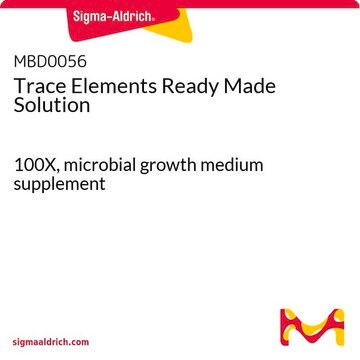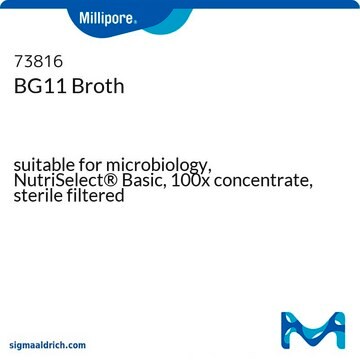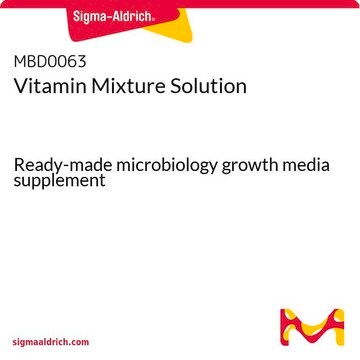92949
Trace Metal Mix A5 with Co
suitable for microbiology, Sterile supplement recommended for the culture and maintenance of Cyanobacteria
Synonym(s):
Trace Elements solution
About This Item
Recommended Products
Quality Level
sterility
sterile (Filtered and Aseptic Handled)
form
liquid
shelf life
limited shelf life, expiry date on the label
application(s)
environmental
life science and biopharma
microbiology
storage temp.
2-8°C
suitability
cyanobacteria
General description
Application
Components
H3BO3 2860 mg
MnCl2 · 4H2O 1810 mg
ZnSO4 · 7H2O 222 mg
Na2MoO4 · 2H2O 390 mg
CuSO4 · 5H2O 79 mg
Co(NO3)2·6H2O 49 mg
add 1 mL to 1000 mL BG11 Broth (Cat. No.73816)
related product
Storage Class Code
12 - Non Combustible Liquids
WGK
WGK 1
Flash Point(F)
Not applicable
Flash Point(C)
Not applicable
Regulatory Listings
Regulatory Listings are mainly provided for chemical products. Only limited information can be provided here for non-chemical products. No entry means none of the components are listed. It is the user’s obligation to ensure the safe and legal use of the product.
ISHL Notified Names
Substances Subject to be Notified Names
JAN Code
92949-BULK:
92949-25ML:
92949-VAR:
Choose from one of the most recent versions:
Already Own This Product?
Find documentation for the products that you have recently purchased in the Document Library.
Our team of scientists has experience in all areas of research including Life Science, Material Science, Chemical Synthesis, Chromatography, Analytical and many others.
Contact Technical Service






